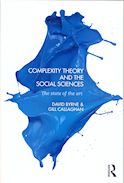How do quantitative methods help us to acquire knowledge of the real world?
This book guides the reader through the complex causal processes
and interactions between the social and natural worlds.
Classification through measurement is perhaps the most important and reliable way
in which we can understand a complex non-linear world, and this refreshing and articulate book
provides students with a novel and useful resource for doing quantitative research.
It provides students with a guide to:
• Interpret the complex reality of the social world
• Achieve effective measurement
• Understand the use of official statistics
• Use social surveys
• Understand probability and quantitative reasoning
• Interpret measurements
• Apply linear modelling in an appropriate way
• Understand simulation and neural nets
• Integrate quantitative and qualitative modelling in the research process
Expressly written with the needs of students in mind,
this book will be required reading for students interested in using quantitative research methods.



